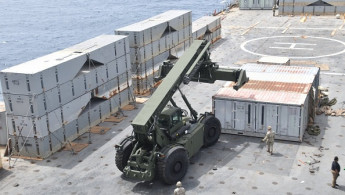UN has not received aid from US pier in Gaza for two days
Food and medicine for Palestinians in Gaza are piling up in Egypt because the Rafah crossing remains closed, and there has been no aid delivered to a United Nations warehouse from a US-built pier for two days, UN officials warned on Monday.
Senior UN aid official Edem Wosornu said there were insufficient supplies and fuel to provide any meaningful level of support to the people of Gaza as they endure Israel's military onslaught on Gaza.
"We are running out of words to describe what is happening in Gaza. We have described it as a catastrophe, a nightmare, as hell on earth. It is all of these, and worse," she said.
She told the UN Security Council that the closure of the Rafah crossing from Egypt had stopped the delivery of at least 82,000 metric tonnes of supplies. At the same time, access at Israel's Kerem Shalom crossing was limited due to "hostilities, challenging logistical conditions, and complex coordination procedures."
Egypt said on Monday that the crossing is closed due to the threat posed to aid workers by Israel's military operation.
Aid access into southern Gaza has been disrupted since Israel stepped up military operations in Rafah, a move that the UN says has forced 900,000 people to flee.
Israel's UN Ambassador Gilad Erdan told the Security Council that Israel had no other choice but to go after Hamas in Rafah and that the removal of civilians from an active war zone should be supported and not condemned.
"They have moved to a designated humanitarian zone that is being filled with aid. And our hope is for many more civilians to leave Rafah and move out of harm's way," he said. "Temporary evacuation is reversible, but the loss of life is not."
However, Wosornu described the situation for Palestinians at the new sites as horrendous.
In northern Gaza, where the UN warns a famine is imminent, Wosornu said the Erez crossing had been closed since 9 May, and the newly opened Erez West crossing "is now being used for limited quantities of aid, but now areas in the vicinity of this crossing are also under evacuation orders" by Israel.
US Pier
Aid deliveries began arriving at a US-built pier on Friday as Israel comes under growing global pressure to allow more supplies into the besieged coastal enclave. The UN agreed to assist in coordinating aid distribution from the floating pier but has remained adamant that deliveries by land are the best way to combat the crisis.
The UN said that 10 truckloads of food aid – transported from the pier site by UN contractors – were received on Friday at a World Food Programme warehouse in Deir El Balah, Gaza.
However, on Saturday, only five truckloads made it to the warehouse, and 11 trucks were cleaned out during the journey through an area a UN official said had been hard to access with humanitarian aid.
"They've not seen trucks for a while," a UN official, speaking anonymously, told Reuters. "They just basically mounted on the trucks and helped themselves to some of the food parcels."
The UN received no aid from the pier on Sunday or Monday. "We need to make sure that the necessary security and logistical arrangements are in place before we proceed," said the UN official.
Aid offloaded at the pier comes via a maritime corridor from Cyprus, where Israel first inspects it. The pier operation is estimated to cost $320 million and involves 1,000 US service members.
US officials said the pier would initially handle 90 trucks daily, but that number could reach 150. The UN has said at least 500 trucks a day are needed to enter Gaza.
The United Nations has also warned of a severe fuel shortage in Gaza.
Wosornu said 654,000 litres (172,769 gallons) of fuel had been delivered to Gaza since 6 May – one-quarter of the fuel allocations it had been receiving.
(Reuters)





 Follow the Middle East's top stories in English at The New Arab on Google News
Follow the Middle East's top stories in English at The New Arab on Google News


